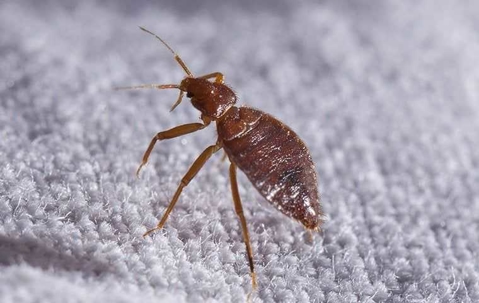A Failure of the Various Kinds Of Bug Control Solutions
In the realm of bug control, a wide variety of methods exist to address and battle the presence of undesirable creatures. From the conventional usage of chemical pesticides to extra innovative organic control options, each strategy provides distinctive benefits and limitations. As we browse through the diverse landscape of insect control services, recognizing the intricacies of each approach comes to be paramount in identifying one of the most reliable program of activity. Remain tuned as we explore the nuanced world of insect control methods and uncover exactly how each kind plays a distinct duty in guarding our settings.
Chemical Pesticides
Chemical chemicals are frequently made use of in pest control to effectively eliminate a variety of bugs and other bugs. These pesticides work by targeting the nerve system of the insects, disrupting their typical functions, and eventually causing their demise. The usage of chemical pesticides has been a staple in the bug control market for decades due to their effectiveness and fast results.

However, it is necessary to use chemical pesticides with caution because of their prospective hazardous results on the setting and non-target types. Improper application or overuse of these pesticides can cause contamination, damage to useful pests, and resistance growth in insect populaces. It is important to follow safety guidelines and regulations when using chemical pesticides for pest control.
Biological Control Methods
Considering the potential ecological influences and dangers connected with chemical pesticides, biological control methods use an even more sustainable technique to handling insect populaces. Organic control includes making use of all-natural enemies, such as predators, bloodsuckers, and virus, to subdue bug populaces. This method is typically much more targeted, influencing just the particular insect varieties while reducing harm to advantageous bugs, people, and the setting.

One advantage of biological control is its long-lasting effectiveness. As soon as established, all-natural enemies can Kings cincinnati pest control aid manage pest populaces continuously without the demand for repeated applications of chemicals. In addition, organic control is often a lot more economical and can help in reducing chemical resistance in insect populaces in time. Overall, biological control approaches offer a environmentally pleasant and lasting service to pest administration.

Mechanical Parasite Control
Mechanical bug control entails the physical control or removal of insects to manage their populaces efficiently. This method is usually used along with various other bug control techniques for extensive parasite monitoring. One typical instance of mechanical bug control is utilizing traps to capture rats or insects. These catches can be established in strategic places where insects are known to dwell, helping to decrease their numbers.
One more mechanical approach is making use of obstacles such as internet, screens, or fencings to obstruct parasites from getting in certain areas. By literally stopping bugs from accessing a location, the possibility of invasions or damages can be considerably lowered. Furthermore, hands-on approaches like handpicking insects off plants or frameworks can be effective for smaller-scale infestations.
While mechanical bug control approaches can be labor-intensive, they offer a non-chemical choice that can be sustainable and ecologically friendly. By targeting pests directly, mechanical control techniques can assist maintain insect populations in check without counting on chemicals.
All-natural Remedies
Making use of all-natural solutions for insect control offers a environmentally friendly and sustainable technique to managing bug populations without resorting to chemical interventions. Natural treatments entail making use of substances obtained from plants, minerals, or various other naturally taking place resources to discourage or eliminate pests.
Furthermore, important oils such as tea tree oil or neem oil have insecticidal buildings that can effectively control parasites while being risk-free for the setting. Another natural remedy is presenting valuable pests like ladybugs or hoping mantises to your yard to exploit damaging bugs. By incorporating these natural remedies into bug management methods, people can minimize their dependence on artificial chemicals and promote a healthier, more balanced environment.
Integrated Parasite Management
Integrated Insect Administration (IPM) is a comprehensive method that integrates numerous approaches to properly manage pest populations while minimizing dangers to human health and the environment. IPM involves the combination of multiple bug control methods such as organic control, environment adjustment, alteration of social techniques, and the usage of resistant plant selections. By using a combination of these techniques, IPM aims to reduce dependence on chemical pesticides, which can have unfavorable effect on environments and human health.
One key aspect of IPM is the emphasis on prevention. By executing procedures to stop parasite invasions before they take place, such as maintaining proper sanitation and securing access points, the requirement for reactive bug control measures is decreased. Tracking and normal evaluations play a critical duty in IPM, permitting very early discovery of pest issues and punctual intervention.
Final Thought
In final thought, the numerous kinds of pest control remedies use a range of alternatives for effectively taking care of pest problems. Organic control techniques utilize natural killers to control pests. Integrated Pest Monitoring combines multiple techniques for a holistic approach to pest control.
Chemical pesticides are frequently utilized in insect control to efficiently eliminate a broad array of bugs and various other bugs.Mechanical insect control involves the physical manipulation or removal of insects to manage their populaces successfully (Kings best pest control cincinnati).Making use of natural treatments for insect control uses a green and sustainable strategy to taking care of pest populations without resorting to chemical interventions.Integrated Pest Monitoring (IPM) is a detailed strategy that integrates various approaches to successfully regulate pest populations while reducing risks to human health and the setting.In verdict, the various kinds of pest control remedies offer an array of choices for efficiently handling bug infestations